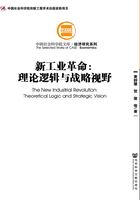
六 结论
1987~2010年,我国ICT投资年均增速达49%, ICT资本存量24年来扩大了近30倍,增速位居世界前列。尽管从理论上看,ICT投资对经济增长具备积极的带动作用,但通过对我国数据的实证检验发现,ICT资本投入对我国经济增长的贡献并不大。2000~2010年,ICT资本深化对我国经济增长的贡献率仅为0.32%,处于欧美多数发达国家20世纪90年代初期的水平。同时,ICT对社会全要素生产率的提高效果也较为有限,年均贡献率低于0.3%。当前我国产业本身技术基础较弱、ICT产业发展时间较短、ICT需要的相应配套投资不足、ICT提高全要素生产率存在滞后期等是导致这一情况出现的主要原因。然而,通过测算ICT对被使用行业的TFP贡献,可发现ICT使用密度较高行业的TFP增长率提高较为明显,显著高于ICT使用密度较低行业,且差距不断扩大,这表明ICT的技术外溢效应是其对经济增长最重要的贡献。随着ICT在我国生产过程中的进一步普及,ICT对经济增长的滞后拉动效果将会逐步显现,其对经济增长的贡献还有很大的上升空间可期。
对我国这样技术后发的国家而言,“推广ICT”比“发展ICT产业本身”更有效,ICT对被使用行业的技术外溢和辐射效应是其最重要的功能。从美国20世纪90年代“新经济”的成功经验来看,鼓励企业加强组织架构方面的投资,提升管理水平,能够对ICT投资形成有效互补,提高ICT的利用效率,缩短投资见效的滞后期。今后,我国应该注重加强ICT的配套服务,推广成功的企业管理经验,以求在“第三次工业革命”的浪潮中,充分挖掘ICT对经济增长的拉动潜力。
参考文献
[1] 张军、吴桂英、张吉鹏:《中国省际物质资本存量估算:1952~2000》,《经济研究》2004年第10期。
[2] 汪斌、余冬筠:《中国信息化的经济结构效应分析——基于计量模型的实证研究》,《中国工业经济》2004年第7期。
[3] 施莉:《信息技术对中国TFP增长影响估算:1980~2003》,《预测》2008年第3期。
[4] 孙琳琳、郑海涛、任若恩:《信息化对中国经济增长贡献:行业面板数据的经验证据》,《世界经济》2012年第2期。
[5] 单豪杰:《中国资本存量K的再估算:1952~2006年》,《数量经济技术经济研究》2008年第10期。
[6] Bartel A., Ichniowski C., Kathryn S., “How Does Information Technology Affect Productivity? Plant-Level Comparisons of Product Innovation, Process Improvement and Worker Skills”, Quarterly Journal of Economics, 2007(4).
[7] Brynjolfsson E. &Hitt L. M., “Computing Productivity: Firm-Level Evidence”, Review of Economics and Statistics, 2003(4).
[8] Brynjolfsson E. & A. Saunders, Wired for Innovation, Cambridge: The MIT Press, 2010.
[9] Colecchia, A., and P. Schreyer, “ICT Investment and Economic Growth in the 1990s: Is the United States a Unique Case? A Comparative Study of Nine OECD Countries”, Review of Economic Dynamics, 2002(1).
[10] Daveri, F., Information Technologies and Growth in Europe, University of Parma, May, Mimeo, 2001.
[11] Hall, R., Jones, C., “Why do some Countries Produce so much more Output Per Worker than Others? ”, Quarterly Journal of Economics, 1999(1).
[12] Jalava, J., and M. Pohjola, “Economic Growth in the New Economy”, WIDER Discussion Paper, 2001, Helsinki: UNU/WIDER.
[13] Jorgenson, D., “Information Technology and the G7 Economies”, World Economics, 2003(4).
[14] Jorgenson, D., Vu, K., “Information Technology and the World Economy”, Scandinavian Journal of Economics,2005(4).
[15] Jorgenson, D., Vu, K., “Potential Growth of the World Economy”, Journal of Policy Modeling, 2010(5).
[16] Lipsey R. G., Carlaw K. I., Bekar C. T., Economic Transformations: General Purpose Technologies and Long-Term Economic Growth, New York: Oxford University Press, 2005.
[17] Meijers H., “ICT Externalities: Evidence from Cross Country Data”, United Nations University-Maastricht Economic and Social Research and Training Centre on Innovation and Technology, Working Paper, 2007.
[18] Moshiri S. &Nikpour S., “International ICT Spillover”, in ICTs and Sustainable Solutions for the Digital Divide: Theory and Perspectives, Edited by Steyn J. &Johanson G. U. S., Information Science Reference, 2010.
[19] O'Mahony M. &Vecchi M., “Quantifying the Impact of ICT Capital on Output Growth: a Heterogeneous Dynamic Panel Approach”, Economica, 2005(288).
[20] RWI, and R. Gordon, “New Economy: An Assessment from a German Viewpoint”, Report from a Research Project Commissioned by the Ministry of Economics and Technology of the Federal Republic of Germany, Berlin, 2000.
[21] Stiroh, K., “Are Spillovers Driving the New Economy? ”, Review of Income and Wealth, 2002(1).
[22] Seo H. J. & Lee Y. S., “Contribution of Information and Communication Technology to Total Factor Productivity and Externalities Effects”, Information Technology for Development,2006(2).
[23] Solow, R., “We'd Better Watch Out”, New York Times Book Review, 1987(12).
[24] Timmer, M., Ypma, G., Van Ark, B., “IT in the European Union: Driving Productivity Divergence? ”, Research Memorandum GD-67, Groningen Growth and Development Centre, 2003.
[25] Venturini, A., “Irregular Migration: Incentives and Institutional and Social Enforcement”, RSCAS Working Papers Carim2009/03, European University Institute, 2009.
[26] Vu, K., “ICT as a Source of Economic Growth in the Information Age Empirical Evidence from the 1996-2005 Period”, Telecommunications Policy, 2011(4).
[27] Yoo, S-H., “Does Information Technology Contribute to Economic Growth in Developing Countries? ”, A Cross-country Analysis, Applied Economics Letters, 2003(10).